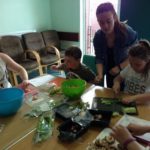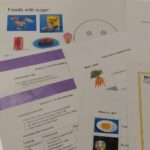‘… and maybe that dish isn’t identical the next time you make it, as you use your emotions when you cook …’ Neil Forbes, Chef (from twitter) One of my friends thinks I’m a great cook. I’m not really – average at best. I can do the basics – and I have perfected things that …
CFHS updates
CFHS blog – Bad mood soup: a personal take on how you feel affects what you cook
Also posted in CFHS Blog
Area of Work: Information provision
Cooking skills blog: Cooking skills research – Reasons to be cheerful, part one
Earlier this year, around 50 people, many who run or manage cooking skills activities came together to hear evidence about the impact of community cooking activities. They heard from Professor Martin Caraher (City, University of London) and Dr Ada Garcia (University of Glasgow). Lyndsay Clark (Fife Health & Social Care Partnership) and I discussed the …
Also posted in CFHS Blog, Cooking skills research
Areas of Work: Cookery skills, Information provision, Research and evaluation
Guest blog: Sue O’Neill-Berest from Cyrenians on food insecurity, cooking and using CFHS development funding to run sessions for young mums

Something to eat, someone to eat with The Food and Agricultural organisation of the United Nations has suggested that 8.4 million live in food insecure households in the UK. (Taylor, 2016) Some research conducted predominantly out with the UK found no significant positive link between the ability to cook and food security, whilst other studies …
Also posted in CFHS Blog, Recruiting and working with vulnerable groups
Areas of Work: Food poverty and access, Funding, Information provision
1st World Congress on Migration, Ethnicity, Race and Health
Florence Dioka from Central and West Integration Network (CWIN) and our colleague Jacqui presented the poster below at the 1st World Congress on Migration, Ethnicity, Race and Health, on 18 May 2018. It explains how they carried out community-led research into food security and insecurity, plus shares some of the findings. Food security and insecurity-poster You …
Also posted in News, Publications news
Areas of Work: Food poverty and access, Networking and learning development
CFHS blog – How can you support people with learning disabilities to eat better?

Finding good resources suitable to help people with learning disabilities to eat well can be a real challenge. The healthy eating, healthy living training pack is a unique tried-and-tested resource that provides thorough information on how to promote healthy eating messages in an interactive, simple and fun way for people with a range of learning …
Also posted in CFHS Blog, Recruiting and working with vulnerable groups
Areas of Work: Food and nutrition training, Information provision, Learning disability
Self-evaluation programme for community cafes
Between August 2017 and March 2018 we worked with a small group of community cafes to look at self-evaluation. Together they developed a list of community cafe outcomes to reflect the range of differences cafes can make for their customers, volunteers and community members. Six of the cafés involved carried out self-evaluation activities in the last few months. …
Also posted in News
Areas of Work: Community cafes and retailing, Research and evaluation
Community Food Social Enterprise Network and community retailers ‘sharing good practice’ sessions
Around 40 community food initiatives took part in an event on 7 March, run jointly by CFHS and Senscot. A community food social enterprise network session was held in the morning, and a community retailers ‘sharing good practice’ session in the afternoon. The morning session looked at issues that community food social enterprises (or aspiring …
Also posted in Events and conferences, News
Areas of Work: Community cafes and retailing, Networking and learning development
Time to Digest
Despite the Arctic conditions and transport systems in chaos, practitioners, policy makers and researchers from across Scotland and beyond met in Glasgow for this latest get together looking at measurement of food poverty and how this understanding can be best applied within policy and practice. Organised by NHS Health Scotland jointly with A Menu for …
Also posted in News
Area of Work: Food poverty and access
Capacity building fund 2016/17 – feedback from funding recipients
About the Capacity Building Fund Community Food and Health (Scotland) launched the Capacity Building Fund in 2015. The purpose of the Fund was to provide small amounts of funding (up to £500) for learning or training opportunities for staff, volunteers or management committee/board member involved in groups running community food and health activities. The aim of …
Also posted in Funding news
Area of Work: Funding

Matter of fact
With the latest Scottish Health Survey results due to include data from the three new food insecurity questions and research work ongoing across the UK, CFHS is delighted to be offering the latest opportunity for researchers, practitioners and policy makers to come together to digest the latest information and explore future opportunities. Working alongside A …